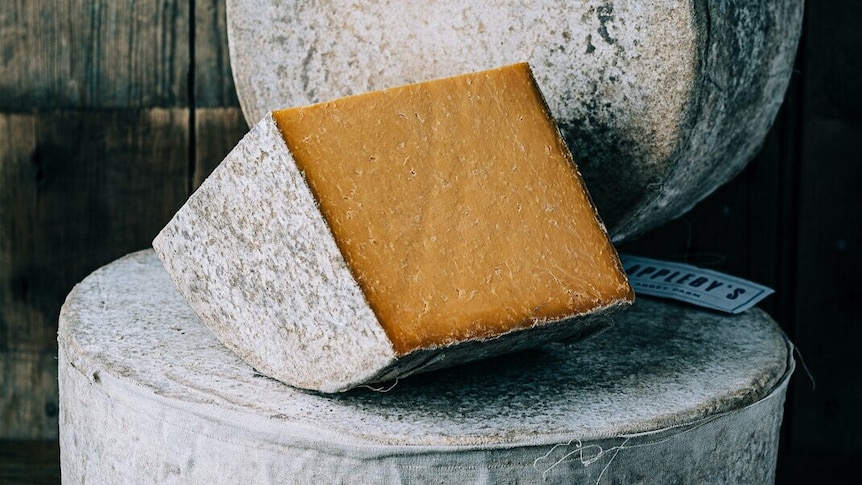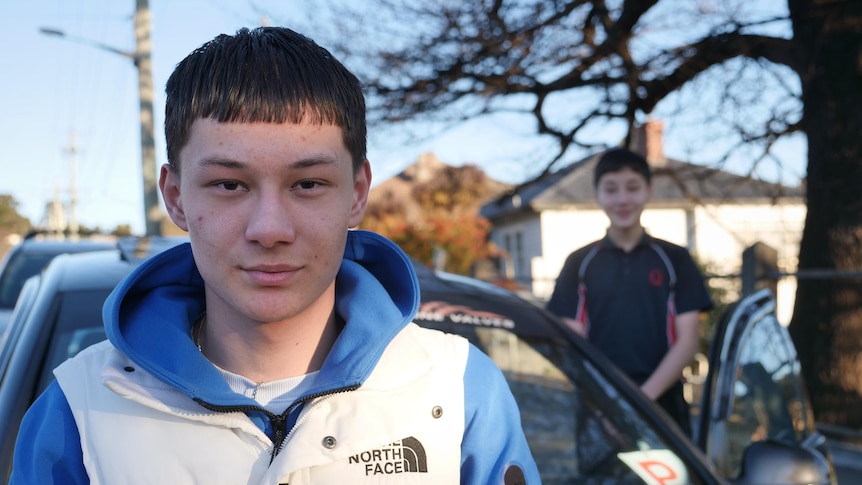A dozen raw milk cheeses from the United Kingdom have been approved for export to Australia in a deal likely to please cheese lovers, but not necessarily local cheesemakers.
Key points:
- Consumers will be able to choose from a dozen raw milk cheese varieties from the UK following a new deal
- Only two cheesemakers in Australia can legally sell raw milk cheese
- Government authorities say local cheesemakers are on a level playing field, but not all producers agree
Paul Appleby from the West Midlands region of England said the “exciting” deal was a win for English cheesemakers, who make the semi-hard cheeses on-farm from fresh cow’s milk.
He makes two cheeses on the list: Appleby’s Cheshire and Double Gloucester.
“We’ve been selling out to America for quite a while but Australia is certainly a market we’d love to be in,” he said.
“I think we probably pasteurized our cheese about three times about 15 or 20 years ago, and never really had a lot of success with it.
“But it is a constant source of worry. Obviously TB’s [Tuberculosis] an issue still in this country, so we still have to be very wary of that.
“Pasteurizing may be something we may have to do at some point, but we certainly wouldn’t want to.”
‘Fantastic for consumers, raw deal for farmers’
For international cheese specialist Will Studd, who first applied to import English raw milk cheeses 18 years ago, the decision is a dream come true.
“These cheeses used to be imported to Australia 40 years ago,” Mr Studd said.
“When I first started in the cheese industry we used to import and sell these cheeses, no problem.
“The idea that they were banned for the last 20 years on some sort of health grounds is absolute nonsense — it’s a story peddled by Food Standards Australia for no good reason, it’s all linked up to this great free trade agreement.”
Food Standards Australia New Zealand (FSANZ) did not respond to Will Studd’s “health ban” claims when contacted by the ABC.
While Mr Studd has welcomed the deal, he says it is not fair to local cheesemakers.
“It’s fantastic for cheese choice, for consumers and lovers of great cheese, but … it doesn’t allow Australian cheesemakers to be able to make the same cheeses, and that is just wrong,” he said.
Mr Studd said the whole purpose of his application in 2004 to import raw milk cheese varieties “was to allow consumers a greater choice not just of imported cheese but of local cheese”.
However, he said, since that time “almost 70 per cent of our small farmhouse producers have disappeared.”
“Milk is cheaper than water in Australia.
“Do we want to have small family farms anymore? They’re not allowed to produce cheese with an authentic taste to place, something that tastes different, something that … genuinely reflects the landscape like the great benchmark cheeses of Europe.”
Bilateral trade to ‘level playing field’
However, the Department of Agriculture, Fisheries and Forestry (DAFF) said the UK cheese deal was separate to the free trade agreement between the two countries.
DAFF’s director of imported food Tania Martin said there was a “level playing field” as Australian cheesemakers could make the same cheeses locally.
“The requirements are exactly the same whether they’re being produced domestically, or whether they’re being imported, we’re assessing the cheeses to exactly the same requirements,” she said.
She said Australian raw milk cheesemakers must meet the requirements in the Food Standards Code, Standard 4.2.4 – Primary Production and Processing Standard for Dairy Products.
Since DAFF started accepting applications in 2016 from eligible countries, those free of foot and mouth disease, it has received this one from the UK and one from France.
“So with France they had previous permission to export Roquefort to Australia, so Roquefort cheese has been coming in since 2005, and then France also applied for an additional cheese which is Ossau Iraty and that was finalized last year,” she said.
Tough regulatory regime ‘too difficult’ for NSW cheesemakers
In Australia, local production is regulated by state-based food authorities.
Burringbar cheesemaker Debra Allard said the regulatory process to make raw milk cheese was too difficult and not worth it.
“I only pasteurise at 65 degrees and that’s still within the legal parameter, commercially it’s 72 degrees, so my cheese is fine,” she said.
“I’d rather not have to bow and scrape to the NSW Food Authority.
“You do a lot of extra testing for raw milk cheese, and that’s an extra cost that you tend to wear.
“People don’t want to pay for an expensive cheese and they don’t want it to go off quickly either.
“My cheese is awesome, it tastes like a French-made cheese because of the way I make it and the fact that we’ve got Jersey milk is an awesome product.”
The NSW Department of Primary Industries said raw milk cheesemakers must complete a form describing the steps used to make it.
“The pro forma can demonstrate to the Food Authority that the production process used is effective in reducing the numbers of L.monocytogenes to a safe level,” a spokesperson said.
“There are several steps and scientific trials that cheesemakers wishing to manufacture raw milk cheese must go through in order to demonstrate compliance with food safety standards.
“The maturation of the cheese must meet certain time, temperature and water content requirements, a process which has a similar effect to pasteurization in reducing pathogens.”
High entry barrier for Aussies
That process took Pecora Dairy at Robertson, in the Southern Highlands, two years.
Pecora Dairy was the country’s first raw milk cheesemaker and remains one of just two dairies making the product, according to owner Cressida Cains.
She said the milk from Pecora’s East Friesian ewes was taken straight into the vat to make cheese.
“What we’re doing, which has got no heat treatment at all, really allows a complete expression of the indigenous microbes that are in the milk when the animals have been milked to be expressed through the cheese,” she said.
Ms Cains said there was quite a high barrier for Australian cheesemakers to be able to make raw milk cheese.
“In many ways that’s fair and right for Australia because we need to make sure that our cheesemakers really fully understand the process,” she said.
“It’s a science — raw milk cheesemaking isn’t sort of a hit-and-miss and let’s-see-how-we’ll-go [process].
“We still need to test every batch of raw milk cheese, which does make it a very expensive process in Australia.
“So the information, as I understand it, is that we are on a level playing field with these cheeses that are coming into the country but I genuinely do hope that that’s the case.”
[Landline raw milk cheese]
.

